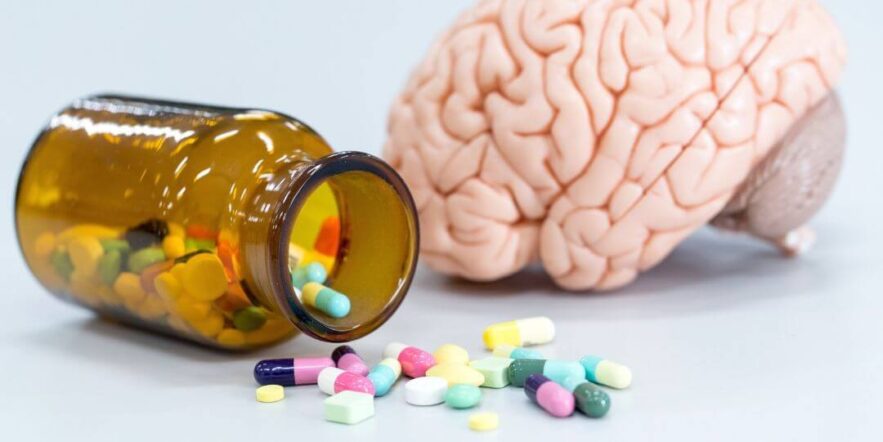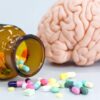Nootropics is an umbrella term that can refer to anything from a prescription drug, supplement or other substance that enhances cognition function, particularly memory. They are often referred to as “brain drugs” and are most often used by students, as well as business professionals and athletes.
Of these many drugs very few can make a scientific claim of improving memory, concentration or any cognitive improvement. The FDA has been cracking down on websites that make claims that have not been substantiated by research. See below some examples that the FDA included in a letter of warning to one website about claims that have no evidence.
Common Names
Racetams: Nootropil (piracetam), Ampamet, Draganon (aniracetam) and (oxiracetam); choline; ampakines; Vitamin B derivatives; amphetamines: Adderall (dextroampetamine/amphetamine) Ritalin, Concerta (methlphenidate) Vyvanse (lisdexamfetamine); wakefulness promoting drugs: Provigil (modafinil); Nuvigil (armodafinil); caffeine; ginseng; ginko biloba. More than 130 substances are considered nootropics.
No Government Oversight
Without government oversight the amount of nootropic in the pill you take could be almost nothing or multiples of what the label claims. A Research Letter published in JAMA reviewed a small research study about a single ingredient, piracetam and found that the amount of piracetam measured in one serving size (two pills) was 1398 mg but the label claimed it would be 1600 mg.
Toxicity levels- the amount at which the drug can become toxic – are not standard or reviewed by the FDA and you can easily be misled. In the same study the maximum recommended daily dose for piracetam ranged on some labels to be two pills and on another label 12 pills!
Side Effects and What to do About Them
Because many products that are considered nootropics are available over the counter, people sometimes incorrectly assume they are safe to take. In addition, any nootropics are passed off as dietary supplements, which are largely unregulated and often don’t have clinical testing to demonstrate their efficacy and safety.
Common side effects of using nootropics can include migraines, headaches and skin rashes. In some cases, such as when too much of a nootropic is taken or different kinds of nootropics are mixed, the results can be life-threatening.
Some people can also experience major sleep problems (especially with amphetamines and wakefulness-promoting drugs as they are stimulants), even after they stop taking nootropics. This can diminish overall sleep quality, which can negatively impact the quality of ones’ daily life.
Withdrawal symptoms are also an issue for some users of nootropics. For example, some people who took Provigil and then quit the drug showed signs of low energy, depression, concentration problems and overall fatigue.
Amphetamine-based drugs used as nootropics are normally prescribed for ADHD (attention-deficit/hyperactivity disorder). They also lead to spikes in dopamine and epinephrine in the brain, which can lead to tolerance to the drugs and possible habit formation. They can also have impact appetite, mood swings, irritability and sleep.
Drug Interactions
While some people might take a single nootropic at a time, others like to mix them for more powerful results, a practice known as “stacking.” The problem with stacking nootropics is that mixing them can actually lead to potentially dangerous reactions within the body. Using a stack can potentially lead to heightened side effects or create new side effects and therefore make the use of nootropics that much more risky.
Effectiveness and Considerations
One thing to consider is that not all nootropics will work the way they are advertised on the label. In fact, some nootropics may have little to no effect at all since, with the exception of prescription drugs that are nootropics, they have not been subject to rigorous testing for efficacy. Much of the evidence supporting the use of nootropics has been based on anecdotal reports.
Brain scans have indicated that certain nootropics can cause alterations to brain chemistry and the way the brain works. Some research even indicates that the brain can shrink or expand depending on nootropic use. There is also no research available to determine what happens to the brain after a person takes nootropics over the long term, and then stops.
There is also a lack of research right now about the potential long-term risks of using nootropics.
Alternatives to Nootropics
If you really feel you need a boost in the area of cognitive ability, you may want to examine and adjust your existing routine and make lifestyle changes. Perhaps you are not getting enough sleep or your diet is not sufficient in providing your brain with the proper nutrition.
There is some evidence to suggest that B vitamins may help with brain cognition. Low levels of B vitamins have been associated with poor memory function and slow information processing. B vitamins are known to be crucial in converting food to fuel for cellular energy.
Many herbal supplements are also considered brain boosters. For example, turmeric, the active ingredient in the herb curcumin used in curries, works to improve blood flow to the brain, which helps improve memory and learning. It also increases levels of serotonin and dopamine in the brain. Some studies have also indicated ginkgo biloba improves short-term memory and sharpens attention.
There has been an explosion in recent years of “brain games” or “brain training” apps that supporters say are a great to increase one’s cognitive abilities and memory. The scientific results, however, have been mixed. In 2014, a group of 70 cognitive psychologists and neuroscientists released a letter expressing concerns over claims made by brain training program.
How They Work (Method of Action)
Nootropics can alter the way the brain works. Some sections of the brain may increase or decrease in physical size due to use of certain nootropics. One thing that is not yet fully understood is the long term effect on the body after a person stops taking one or more nootropics. This can pose a potentially serious health risk to the user.
The conclusion is that until there is sufficient evidence to show that nootropics are not only effective, but safe, you are likely gambling with your potentially permanent changes to your brain. Making various lifestyle changes can positively impact not only the quality of your life but also your overall mental performance.
What worked for you?
Share your experience with nootropics in the Disqus box below.
Further Reading
Nootropics as Cognitive Enhancers: Types, Dosage and Side Effects of Smart Drugs
Specific health claims that are false from the FDA’s letter to Peak NootropicsLLC, AKA Advanced Nootropics February 2019:
Unsubstantiated Adrafinil claims from the website:
“People who have taken Adrafinil have suggested that it greatly improves cognition and memory. It can be used in times of high mental demand to help promote focus and mental alertness. There is evidence that Adrafinil can help with focus and even assist with ADHD symptoms. It should in no way be self-prescribed or used without advice of a doctor.”
Unsubstantiated Aniracetam claims from the website:
“Memory Enhancement”
“Another interesting action of Aniracetam is the observed anxiety reducing effects.”
“Currently, it is approved for general memory and attention disorders and is commonly given to the elderly to help reduce symptoms of degenerative cognitive disorders.”
Unsubstantiated Bacopa Monnieri claims from the website:
“…used to treat stomach disorders”
“…use to…stave off illnesses such as Alzheimer’s”
“…helps in protecting infants against neonatal hypoglycemia also known as low sugar”
“…reduces the risk of hypoglycemia in infants”
“…used to control blood pressure”
Unsubstantiated L-Dopa claims from the website:
“L-Dopa is often recommended for Parkinson’s patients, as it helps in controlling involuntary movement generated in the skeletal muscles.”
“[L-Dopa] is known to reduce the effects of Parkinson’s disease…. Although you might not be able to see a radical difference within a short period of time, you will be able to avail positive benefits over a course of time.”
Unsubstantiated L-Theanine claims from the website:
“…it could be a vital component in the treatment of Alzheimer’s disease.”
“…it could be an aid in combating schizophrenia or schizoaffective disorder.”
“…L-Theanine could be useful in the prevention of ischemic neuronal damage that may occur due to stroke.”
“…could be used in…lowering of lipids within the bloodstream and fighting obesity.”
Unsubstantiated Noopept claims from the website:
“Noopept is being investigated as a possible treatment for Alzheimer’s.”
“Some doctors also prescribe [Noopept] to aid in the reduction of symptoms in patients with neurological diseases.”
Unsubstantiated Oxiracetam claims from the website:
“[Oxiracetam] has been cited in the medicine field as having benefits such as, increasing cognitive function and processing.”
“Overall, [Oxiracetam] improves cognition and memory and may provide an increase in sensory perception or reflexes in some users.”
Unsubstantiated Phenibut claims from the website:
“The benefits claimed by many [from Phenibut] often relate to … a reduction in anxiety.”
Unsubstantiated Phenylpiracetam claims from the website:
“Phenylpiracetam may be an alternative for those with ADHD not wanting to resort to typical ADHD medications.”
“Phenylpiracetam also increases the level of dopamine and noradrenaline in the brain which may explain its’ [sic] stimulating and mood elevating properties.”
“POTENTIAL PHENYLPIRACETAM BENEFITS”
o “Helps consolidate memory”
o “Enhances Alertness & Focus”
Unsubstantiated Piracetam claims from the website:
“[Piracetam’s] primary medical use is as a neuro-protective agent before or after stroke. The substance is believed to reduce the risk of ischemic stroke as well as minimize post-stroke damages to the brain. It is also an anti-coagulant and anti-thrombotic agent which is often used safety [sic] in conjunction with other therapies.”
“For instance, there has been evidence in studies for effectiveness [of Piracetam] in improving symptoms in Alzheimer’s and Dementia patients.”
“[Piracetam] has been observed to be effective in increasing: cognition and memory, learning, focus and reaction times but these results seem to vary.”
Unsubstantiated Pramiracetam claims from the website:
“POTENTIAL PRAMIRACETAM BENEFITS”
“COMMONLY CLAIMED BENEFITS”
“Overall Improved Cognition.”
“Higher Sensory Perception.”
“Improved Working/Long-Term Memory.”
Unsubstantiated Rhodiola Rosea claims from the website:
“…Rhodiola is said to increase the release of dopamine, which makes it an ideal drug to induce a natural high.”
“Rhodiola supplements are supposed to help in the reduction of cancer cells. Early studies on the drug claim that it is a good supplement to consider for reducing the risk of developing bladder cancer.”
“Those that suffer from high cholesterol can consider consuming this natural herb to reduce the risk of developing heart ailments. This chemical helps in reducing the bad cholesterol…”
Unsubstantiated Uridine claims from the website:
“Uridine helps…prevent[] the onset of diseases like Alzheimer’s or Dementia.”
“One of the most significant effects of the drug is to enhance cognition. It assists in increasing a person’s cognitive behavior. If the person has undergone some brain trauma, then the drug can be used to reverse said trauma to a certain extent…”
“Uridine is used to reduce internal inflammation…”
“… the drug [Uridine] is said to reverse heart ailments…”
“Uridine triphosphate is said to reduce the risk of heart attack…”
“The drug [Uridine] is said to be effective in reversing osteoporosis…”
“Uridine is used to treat fibrosis…”
From the FDA letter: “Your products Adrafinil, Aniracetam, Bacopa Monnieri, L-Dopa, L-Theanine, Noopept, Oxiracetam, Phenibut, Phenylpiracetam, Piracetam, Pramiracetam, Rhodiola Rosea, and Uridine are not generally recognized as safe and effective for the above referenced uses…”






